"Friedrich Hölderlin", Schwarzriesling, "Wilhelm Hauff", Spätburgunder or "Eduard Mörike", Samtrot, that's how it might look on the wine list in the cellar "Zum Viertelesschlotzer" in Lauffen am Neckar. And whoever orders one of these poets here gets a glass of Kabinett or Spätlese, all wines from the "Lauffener Weingärtner" cooperative. If it is even a "Katzenbeißer", then it comes from the very best site in the region, from the good 500 hectares of vineyards above the railway station in Lauffen, along the Zaber. A partly quite steep terrain, known for red wines of the grape varieties Schwarzriesling, Trollinger, Samtrot and Lemberger.
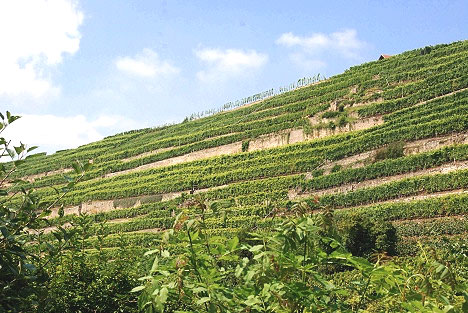 |
| Steep slopes of Lauffen% high above the Zaber% a tributary of the Neckar. |
Now I see many noses wrinkling: Schwarzriesling, Trollinger or even Lemberger! Phew! In the noble wine world, these wines rarely rise to the pedestal. There, wine princes like Pinot noir, Cabernet Sauvignon, Merlot or - especially in Germany - Riesling are enthroned. Wines sometimes have it almost as hard as poets to achieve fame and glory. Hölderlin, born at the foot of the vineyards in Lauffen, was not entirely unknown among literary figures during his lifetime. But he was considered a romantic melancholic and a mere imitator of the poet prince Schiller. It was not until many decades after his mental derangement and death that Hölderlin's odes, elegies and hymns were classified as the pinnacle of German Romanticism. In his work "Brot und Wein" (Bread and Wine), he makes a Bacchus-Christ figure arise: "...and why poets in meagre times? But they are, you say, like the holy priests of the god of wine, who went from land to land in the holy night".
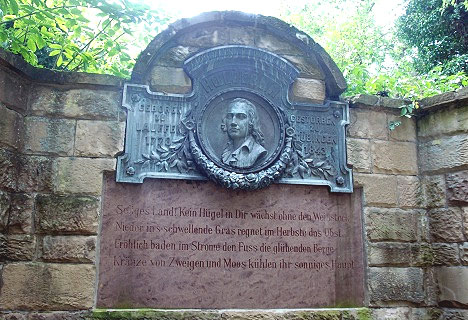 |
| Monument at Hölderlin's birthplace% very close to the vineyards. |
A few metres from the house where Hölderlin was born in 1770, there is a modern sculpture in a traffic roundabout: Hölderlin is depicted twice in it, each at the end of a quill, on the left as a small child, on the right as a young poet, in between Schiller and Goethe, naked as Siamese twins who have only one abdomen. What impresses me is not so much the sculpture as the vineyard that can be seen in the background. "Blessed land! No hill in you grows without the vine," it says on the Hölderlin monument. Indeed, the terraced vineyards above the little river Zaber invite us to reflect on what wine can mean to man; why poets repeatedly praise the vines and vineyards, as a symbol of life, of home, of nature. It is of no consequence that in the vineyard, which is laid out like a huge amphitheatre, vines grow that have not achieved worldwide success (until today). Trollinger, Schwarzriesling, Lemberger, and all the others.
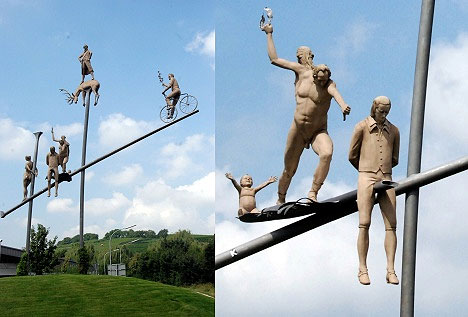 |
| Poet's sculpture in a traffic roundabout. In the background, the vineyards not far from the poet's birthplace. |
Now would be the time to taste at least one of these wines, despite all the wrinkling noses. If you are travelling by car, an extensive wine tasting is out of the question. For I still have to track down at least traces of Mörike and Hauff, I owe this to the "geschlotzten Viertele". On the way to the church in Cleversulzbach, where Mörike was a pastor, I stopped in the Catholic winegrowing village of Königheim. I was attracted by the beautiful baroque church of St. Martin. I stopped at the main road. At a winery, almost like a picture book: Weingut Siegfried Schmidt. That's how I ended up in Tauberfranken, where the Bocksbeutel is at home, even though the wine region belongs to Baden-Württemberg.
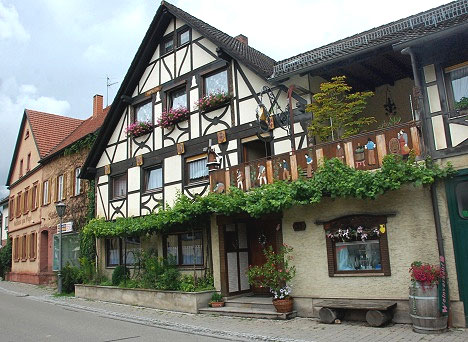 |
| Siegfried Schmidt Winery. In the middle of the wine village of Königheim. |
Now noses can probably wrinkle even more. Where have I landed? In a winery - hardly known to the great German wine world - last year's Schwarzriesling, just bottled. And it had to be!
The only wine trophy I took with me this time is this Schwarzriesling. Symbol of a journey in search of southern German poets. That wine nevertheless accompanied me on this journey, day after day, was ensured by Hölderlin, Mörike, Hauff with their works and the places left behind by their lives and work.
"These country wines from the Tauber valley taste of land and earth and copses, they are deep and pure like a bell tone," Kurt Tucholsky is said to have noted. At least, that's what the tourist advertising claims.
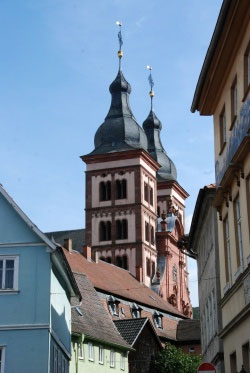 |
| Baroque church of St. Martin in Königheim. |
Away from the big-name wines, I enjoyed the velvety finish, the fine spice of fresh almonds, the subtle fruity notes and of course the obligatory red berries. No wood far and wide, but wine: just country wine. Actually, there is no need for the many tricks with which wine is artificially loaded again and again today.
Despite Tucholsky and Schwarzriesling, I finally arrived at Mörike in Cleversulzbach. A glance up at the old rooster (which has long since been a new one, the old one rests in the Schiller National Museum in Marbach): "Come and carry it into the house, have a cool glass of wine with me.
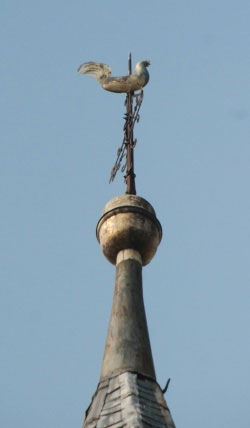 |
| The tower cock on the church in the Mörike village of Cleversulzbach. |
This is how the old, worn-out tower rooster in the vicarage was received by Mörike and sung about in a poem. On the 74th birthday of a neighbour who was a friend, Mörike found in the vine a symbol of life: "...to the beloved vineyard he strives anew every spring, until he himself is transplanted as a noble vine by the Lord!"
Actually, the village has long belonged to the municipality of Neuenstadt am Kocher in the Heilbronn district. And the grapes from the Föhrenberg, the wine region in Cleversulzbach, are now vinified in the Eberstadt cooperative. The wine village of Cleversulzbach has mutated into a Möriken village. Of the three poets to whom a wine is dedicated in Lauffen, Wilhelm Hauff, who died at an early age, is still missing. Actually, Hauff had more to do with the woods than with vines. His "Wirtshaus im Spessart" ("Inn in Spessart") has achieved its greatest fame to date, above all through the film with Liselotte Pulver.
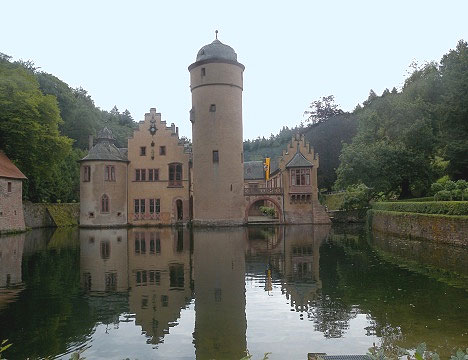 |
| Mespelbrunn moated castle% The setting in the film "Das Wirtshaus im Spessart". |
In the moated castle at Mespelbrunn, the supposed robber chief, disguised as a swan, escapes from the tower where he has fled. The morality tale, of course, has a happy ending. Does Wilhelm Hauff really have nothing to do with wine? Or does he? After visiting the famous Bremen Ratskeller, where Germany's oldest cask wine is still stored today, he also wrote a novella about wine: "Phantasien im Bremer Ratskeller - ein Herbstgeschenk für Freunde des Weines". So the path leads - at least in thought - from southern Germany to the north, where in Hauff's tale fantastic spooky images develop, caused by alcohol consumption. In Bremen's subterranean Ratskeller, the spirits of various figures come to life: the twelve apostles as well as the god Bacchus, figures from Christian and classical mythologies. Thus, three German poets from the Romantic era have accompanied me on my own wine route. That's why tonight I'm "sipping" with great pleasure a "Viertele" Schwarzriesling from Württemberg, accompanied by the good wishes of long-dead poets.
Cordially
Yours sincerely